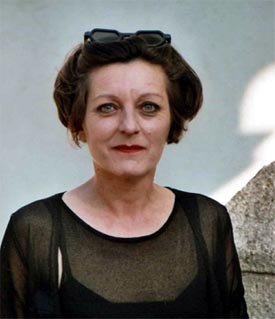Zeitgeistlyrik: Literature Nobel Prize
Herta Müller 2009:
A Banat Swabian poetess
Was born in 1953
In a hamlet called Nitzkydorf,
Which lies in Romania.
She came to Berlin in 1987.
Wrote verses to mete out justice
To the fate of German Romanians,
Who were departed to work camps.
The other way round.
Jews died in concentration camps,
80,000 ethnic Germans from Romania,
Uprooted and banished,
Suffered hunger and death
In the Ukranian camps.
Survival strategies and dreams
At the end of the Second World War.
If Bertold Brecht’s Furcht und Elend
Im Dritten Reich
Told us about the Nazi terror,
Herta’s verses and prose reveal
The sadness and angst of her lost people.
In a small hamlet in Banat,
Small Herta tells us
In her hard, Banat-German accent,
How hostile her home environment was.
She speaks of her doubts and fears,
For it is plain to see:
She’s made of another genetic material
That made her vulnerable to her environs,
Like underdogs everywhere in this world.
How unbearable for Romanians,
The Banat-Germans had their own
Culture, tradition
And way of life.
But pray, don’t ethnic Germans say
The same things about migrants
Eking out a living here?
Herta speaks a poetic language
Of a gone but not lost past,
Of the misery, angst and terror
Felt by her people.
Her books emphasize
The cruel, inhuman face of communism,
Under Nicolae Ceausescu.
A chronist walking
Along the thin line,
Between poetry and terror,
Where every line is a cry
Against injustice
With pregnant titles:
The Fox Was even Then a Hunter (1992),
Herztier (1994),
In the Hair-knots Lives a Lady,
The King (Ceausescu) Bows and Kills (2000)
The Pale Gentleman and the Mocca Cups (2005).
Herta said:
‘My innermost desire is to write
I can live with it.’
Her literary style is precise,
Laconic and matter-of-fact.
Despite her publications,
Ms. Müller was a nobody.
Without her notes on Oskar Pastiors
She couldn’t have penned ‘Atemschaukel.’
It became more than a swing of breath.
She was shadowed, interrogated and persecuted.
Günter Grass said:
‘I’m very satisfied with the Literature Prize
For Herta from Stockholm.’
Karasek quipped:
‘My mantra is always for Philip Roth,’
And sounded like: ‘My Heart Belongs to Daddy.’
Germany’s literary pope
Marcel Reich-Ranicki:
‘I plead for Roth and wish to say
No more.’
Literary critics form the USA commented:
‘We suggest Philip Roth, Thomas Pynchon,
Joyce Carol Oates
Or Bob Dylan.’
The Swedish Academy gave the prize
For the fourteenth time
To Germany.
Poor Romania. |

|
|